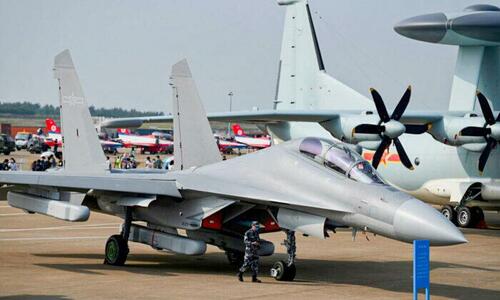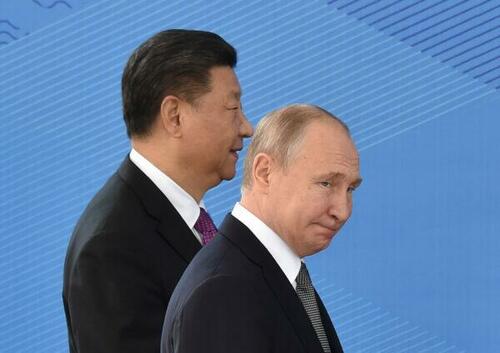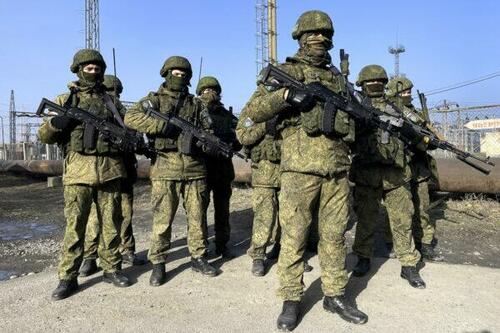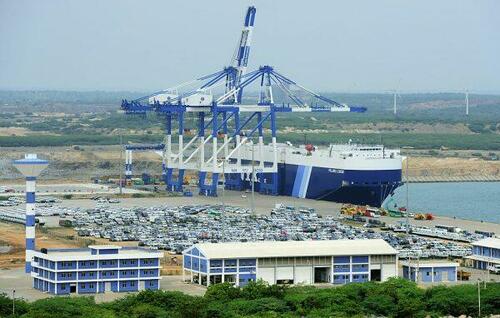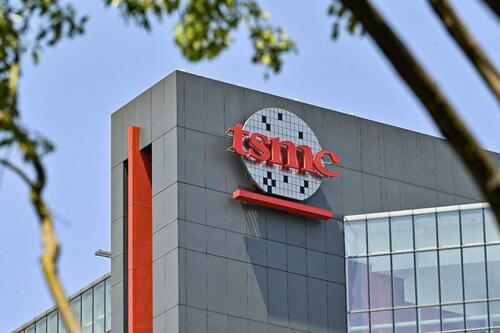Amid Ukraine War, China Threat Rises
Authored by Frank Fang via The Epoch Times,
As the world focuses on Russia’s continued invasion of Ukraine—along with the climbing civilian death toll and growing refugee crisis—it’s also witnessing a seismic shift in the global geopolitical landscape.
Russia’s actions in Europe have drawn the eyes of the United States and its allies to the West, as they did in decades past, as meanwhile a larger, more formidable force gathers strength in the East, setting its sights on dominating the Indo-Pacific, and then the world.
For decades, the Chinese communist regime has been building its economic and military might so as to replace the United States as the sole superpower by mid-century. With the regime acknowledged by the U.S. administration as America’s primary threat, posing its “greatest geopolitical test,” Washington has been shifting its resources and energy to the Indo-Pacific region in a bid to check Beijing’s rising influence there.
But the escalating war in Eastern Europe is frustrating Washington’s plans, analysts say, even as the Biden administration insists that it can focus on two theaters—Europe and the Indo-Pacific—at the same time.
“The revival of Cold War 1.0 (Moscow–Washington) taking oxygen majorly away from Cold War 2.0 (Beijing–Washington) is a blunder of historical proportions where the democracies are concerned,” Madhav Nalapat, a strategic analyst and vice chair of the India-based Manipal Advanced Research Group, recently told The Epoch Times.
Nalapat pinned the blame on Washington and NATO for engaging in a series of strategic missteps that he believed culminated in Russia’s invasion of Ukraine.
Brandon Weichert, geopolitical analyst and author of “Winning Space: How America Remains a Superpower,” held the same view, chiding the Biden administration for choosing to return to “pre-Trump normal” with respect to its relations with Russia—that is, by adopting a policy that sought to “contain Russia” and put pressure on Moscow to be “a good democracy with human rights.”
“Vladimir Putin believes that no more deals can be made with the United States, certainly not with neoliberal and neoconservative elites like Joe Biden, or even Lindsey Graham, running the show in Washington,” he said.
“Under [former President Donald] Trump, this was our last exit ramp, before a real catastrophe happening”—the buildup of the Sino–Russian alliance, he said.
The recent approach has effectively pushed Russian President Vladimir Putin into a corner, according to Weichert. And with no else to turn to, Putin chose to side with the Chinese Communist Party.
But this outcome, he said, could have been averted. While Russa is by no means an ideal or natural partner, given the country’s human rights and military record, Weichert said, it has to be acknowledged that Moscow could have helped the U.S. administration in providing a valuable counterweight to Beijing.
“If we could get the right leader in charge, we would be able to possibly break Russia away from China, because ultimately, Russia still doesn’t trust China,” he said. “And ultimately, Russia would prefer to continue to do business with the Europeans, and to still have positive relations, at least in space, and on nuclear matters with the Americans.”
As this didn’t occur, Russia and China are deepening their relationship, in ways previously unseen. Two weeks before the invasion, as Russia was drawing heavy international criticism for its plans to attack Ukraine, Putin and Xi proclaimed a “no limits” partnership, a bilateral relationship “superior to political and military alliances of the Cold War era.”
This burgeoning partnership is worrisome, Weichert said, because the two countries decided not just to cooperate economically and militarily, but to work together in a “general ideological way.”
“They’re starting to look at the ideological component—the component of autocracy, the concept of multipolarity—having many different powers in the world, as opposed to only the United States running the world, with spheres of influence,” he said.
“That is something that Russia and the Chinese leadership for 30 years have talked about, but they never actually shared or coordinated with one another. Now we see the beginnings of that.”
The White House didn’t immediately respond to a request for comment.
Distrustful Partners
On the opening day of the Winter Olympics, Putin met with Xi in Beijing, displaying a united front against growing international condemnation of their respective regimes.
According to a 5,000-word joint statement, the two leaders said there would be “no ‘forbidden’ areas of cooperation” between their countries.
The statement also revealed that Putin and Xi had decided to support each other geopolitically: China denounced the enlargement of NATO, a key justification for Russia’s invasion, while Moscow backed Beijing’s claim that self-governing Taiwan was a part of China.
The new partnership is, in fact, many years in the making, particularly after 2014 when Russia was hit with multiple sanctions over its annexation of Crimea. Since then, bilateral trade has gone up more than 50 percent and now China is the top destination of Russian exports.
Russia is China’s second-biggest oil supplier behind Saudi Arabia, accounting for 15.5 percent of China’s total imports in 2021. Russia is also a major supplier of gas and coal to China.
While the bond between Russia and China might appear strong on the surface, Weichert said that Putin must be fully aware of what the partnership would entail.
“What’s going on now is, Russia under Putin is very aware that they are relatively weaker than China. And the closer that Putin gets to China, the more likely he’s going to become a second player—second fiddle to Xi Jinping’s juggernaut in China,” he said.
“The last thing he wants to do is go from being sort of pushed around by the West to then switching over to the Chinese, and suddenly being subordinated or assimilated by China into their new growing high-tech empire of Eurasia.”
In Weichart’s view, Putin has already tried to assert his dominance over Xi, when the Russian president decided to deploy Russian troops into Kazakhstan as peacekeepers in January.
“I think Putin was trying to say, ‘Hey, Xi, we can work together to trade in Central Asia, but I’m the alpha male here, you work with me, not the other way around,’” he said.
China has dramatically dialed up its influence in Central Asia—a region of former Soviet states where Russia holds much sway—in recent years, as Kazakhstan, Kyrgyzstan, Tajikistan, and Uzbekistan have all signed up to China’s Belt and Road Initiative (BRI, also known as One Belt, One Road).
Beijing rolled out the initiative in 2013 to increase its economic and political clout worldwide by building up trade routes linking China, Southeast Asia, Central Asia, Africa, Europe, and Latin America.
“The allies—China and Russia—are constantly going to be looking over each other’s shoulder even when they’re working together to push back American power projection, in Eurasia first and eventually throughout the world,” he said.
Bigger Threat
The most important factor making the Chinese regime a bigger threat than Russia is the size of the Chinese economy, according to Weichert.
“The China threat is the longer-term strategic threat,” he said. “They’re the ones with the greater technology base. They’re the ones whose economy is right behind the size of America’s.”
China is currently the world’s second-largest economy, trailing the United States. According to 2020 data from the World Bank, China’s economy is about 10 times bigger than Russia’s.
The economic power behind the Chinese communist regime thus allows it to do things that Russia cannot, Anders Corr, principal at the New York-based political consultancy firm Corr Analytics, said.
“China uses that economic power not only to build its military,” Corr, who is also a contributor to The Epoch Times, said. “China is able to use that economic power for political influence around the world.
“So essentially, they’re able to bribe politicians, whether that’s directly by giving them bags of cash, or they’re able to bribe them through promises of aids, loans, and cheap loans.”
Western officials and experts have criticized China for exporting corruption through BRI or sustaining corruption in BRI-participating nations. The program also has been described as a form of “debt-trap diplomacy,” which saddles developing countries with unsustainable debt burdens, potentially forcing those nations to transfer strategic assets to Beijing.
China Merchants Port Holdings is now running Sri Lanka’s Hambantota port on a 99-year lease, after the South Asian country was unable to service a $1.4 billion loan for its construction in 2017. Seizing the port has allowed Beijing to gain a key foothold in the Indian Ocean.
Critically, the Chinese regime has a unique advantage in the West arising from its sprawling business ties between Western firms, eager to gain a greater pie of the lucrative Chinese market. As a result, Beijing has been able to build clout in the United States and elsewhere, through its own elites—a strategy known as “elite capture.”
“The Chinese Communist Party has done a great job of basically enlisting the elites of the free world. And so a lot of their wealth is tied up in this relationship with China,” Robert Spalding, a senior fellow at the Hudson Institute and retired Air Force brigadier general, told The Epoch Times.
The regime, “by entwining themselves into the fortunes of the elites,” is then able to “push on them and lean on them,” Spalding said. “This is a problem.”
Taiwan
The Chinese regime’s other threat, which has worldwide implications, is its desire to take over Taiwan, a de facto entity Beijing claims as part of its territory. The island, home to the world’s largest contract chipmaker TSMC, produces about 63 percent of the world’s semiconductor chips, compared to the 12 percent produced by U.S. chipmakers.
Seizing Taiwan would give China control over the island’s chip manufacturing facilities, potentially allowing Beijing to block other nations from buying the critical technology, which is used to power nearly all electronics from cars to missile systems.
“I think China does definitely have its eye on Taiwan. China will be watching what we do, what Russia does in terms of Ukraine as a lesson that it can take home, in terms of its strategy for Taiwan,” Corr said.
“So I think that if we don’t truly punish Russia in a serious way, we will be giving the green light to China to do the same thing to Taiwan.”
Complicit?
As the Ukraine war drags on, Beijing has repeatedly refused to condemn Russia for its aggression, nor label the attack as an “invasion.” It has also rejected joining the West in imposing financial sanctions against Moscow, describing such a move as lacking legal basis.
Such signs of tacit support have caused some to suggest that Beijing had played a larger role than it appeared on the surface in facilitating Russia’s assault.
“Moscow is so much under the thumb of Beijing,” Corr said, adding “which makes me think that in the current case of the invasion of Ukraine, it is so not in the interests of Russia … to make itself an international pariah and focus of the world’s attention.”
He added: “That makes me suspect that it’s possible Beijing had asked Putin to do this or encouraged Putin to do this in some way. So I think we have to consider that as a possibility.”
Indeed, there is piling evidence that Beijing knew of Moscow’s military plans prior to the invasion and had discussed it with Russian officials.
Senior Biden administration officials shared intelligence with top Chinese officials about the Russian military buildup near Ukraine, according to a Feb. 25 report by The New York Times. The intelligence-sharing lasted more than three months, the report said, citing unnamed U.S. officials. But China ignored the repeated U.S. warnings, and instead turned around to tell Moscow what it had learned from Americans and that it wouldn’t interfere with Russia’s plans.
A Western intelligence report, first covered by The New York Times on March 2, indicated that senior Chinese officials asked senior Russian officials to wait until after the end of the 2022 Winter Games before invading Ukraine. The request happened in early February, but it is unclear from the report whether Xi and Putin talked about it during their meeting in Beijing.
Regardless of the level of Chinese involvement, the invasion ultimately served to achieve Beijing’s aims, noted lawmakers and experts.
Rep. Ken Buck (R-Colo.) recently told EpochTV’s “China Insider” program that the invasion was a “distraction,” shifting U.S. attention away from the Pacific.
“In China’s view, it serves as a way of siphoning off resources that can be used in other areas,” Buck said.
For Corr, the invasion would distract people from paying attention to China’s problems, such as the genocide against Uyghurs and other Muslim minorities in China’s far-western Xinjiang region and the expansion of artificial islands in the South China Sea.
Gary Bai contributed to this article.
Tyler Durden
Wed, 03/09/2022 – 22:00
via ZeroHedge News https://ift.tt/D7uvmQa Tyler Durden
